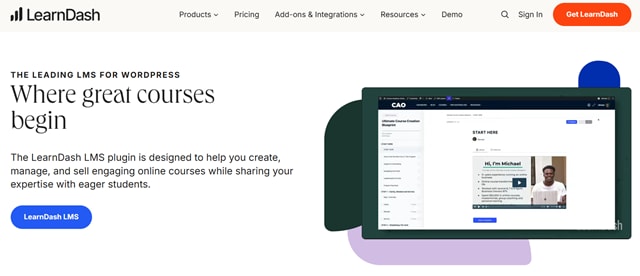If you’re searching for Kajabi alternatives that can still help you build and sell your online content like a pro, you’re in the right place.
We assume you’ve probably tried Kajabi or at least considered it—and yeah, it’s a powerful all-in-one platform for online courses, memberships, and marketing.
But let’s be real: Kajabi isn’t for everyone. Whether it’s the steep price tag, the features you don’t really use, or just wanting something a little more flexible, it’s totally fair to look around.
Top Kajabi Alternatives Worth Trying
Below, we’ve handpicked the best Kajabi alternatives—whether you need a more affordable option, a simpler setup, or advanced features Kajabi doesn’t offer.
1. Teachable
Teachable is designed specifically for online course creators. It is super easy to use, especially if your main goal is to create and sell online courses. It's perfect if you want to jump in and start building your course without dealing with a million marketing settings.

You can organize your content into sections and lectures, offer quizzes, track student progress, and issue completion certificates. Plus, their drag-and-drop course builder makes setup quick — even if you’re not tech-savvy.
It strips things down to focus on what matters most: your content and your students. It’s cheaper than Kajabi, and while it doesn’t have the same built-in email automation, you can integrate with other tools.
Best for: Coaches, teachers, and creators who care more about content than complex funnels.
2. Podia
Podia lets you sell online courses, digital downloads, memberships, webinars, and even run email marketing — all under one roof. The UI is smooth and it's super user-friendly and has a clean, modern interface.

It even has built-in email marketing and live chat support for your customers. Podia offers many of the same core features Kajabi has, but it’s way simpler to use and more affordable. No transaction fees, no hidden upsells, and great customer support.
While Podia covers a lot of ground, it doesn’t have the depth that Kajabi does in terms of funnel building, A/B testing, or advanced automations.
Best for: Solo entrepreneurs who want an all-in-one platform that “just works” without being overwhelming.
3. Thinkific
Thinkific is a strong platform for building online courses with a bit more control. It allows you to customize your course layout, add free or paid lessons, and even offer certificates and prerequisites.
You can build your own course site using customizable themes, and it supports advanced features like drip scheduling, course bundles, and communities.

It’s one of the few platforms that balances strong course features with flexible design tools — and it has a free plan! Kajabi doesn’t offer a free tier, so Thinkific is a great entry point.
Read Also: Teachable vs. Thinkific: Best Online Course Platform?
But keep in mind that Thinkific is more education-focused than marketing-oriented. It lacks a built-in funnel builder, and while it offers basic email functionality, it's not ideal for full-blown campaigns.
Best for: Course creators who want more control over design and structure but don’t need complex marketing automations.
4. Systeme.io
Systeme.io punches above its weight for what it offers — and many of its core features are completely free. It’s an all-in-one platform that includes sales funnels, email marketing, membership sites, course hosting, and even affiliate management. Setup is quick, and everything is centralized so you don’t need to bounce between tools.

If Kajabi feels like overkill for your budget, Systeme.io gives you everything you need to launch and scale your business without breaking the bank.
However, its design templates are more basic than Kajabi's, and the UI lacks polish. While automation works decently, the platform may feel clunky if you prioritize a premium user experience or deep analytics.
Best for: Beginners and budget-conscious creators who want to launch fast without sacrificing essential features.
5. ClickFunnels
ClickFunnels is less about courses and more about selling them — hard. It’s all about building high-converting funnels, landing pages, and automated workflows. You can technically host courses with ClickFunnels (especially in version 2.0), but it truly shines when it comes to marketing strategy and funnel psychology.

If your priority is sales, upsells, and converting traffic like a pro, ClickFunnels could be your powerhouse alternative to Kajabi.
Read Also
The obvious drawback? Course hosting is not its strong suit. It lacks the refined student experience you get with Kajabi or Teachable, and it can get expensive fast if you're stacking features and add-ons.
Best for: Sales-first entrepreneurs who focus heavily on conversion optimization.
6. Kartra
Kartra is another all-in-one platform that leans more into the marketing and automation side of things. It includes everything from landing pages and email marketing to membership sites, checkout systems, and even helpdesk support. You can map out complex funnels visually and track every step of your customer’s journey.

If your business relies heavily on automated funnels, upsells, and behavior-based email sequences, Kartra might actually outshine Kajabi in this department.
The trade-off? Kartra’s learning curve is real. The UI feels dated in places, and it can be a bit overwhelming if you’re not used to building full funnel systems.
Best for: Advanced marketers and business owners who want powerful automation tools.
7. LearnWorlds
LearnWorlds packs a serious punch when it comes to interactive learning. It’s ideal for course creators who want to offer a more engaging experience — think quizzes, interactive videos, note-taking tools, and even built-in SCORM support. You also get a branded mobile app (on higher plans) and pretty advanced analytics to track student behavior.

If you're building an online academy or want to create courses that go beyond just watching videos, LearnWorlds is a solid Kajabi alternative that brings more of a traditional e-learning vibe.
That said, it does have a steeper learning curve compared to simpler platforms. The interface can be overwhelming for beginners, and the funnel-building and email marketing tools aren't as streamlined or integrated as Kajabi’s.
Best for: Online schools, educational institutions, and pro-level instructors.
8. Teachery
Teachery keeps things refreshingly simple. It’s built specifically for course creators who want to focus on content, not tech headaches. The interface is clean, easy to navigate, and super beginner-friendly. You can launch unlimited courses, landing pages, and email integrations without worrying about tech bloat.

If you find Kajabi overwhelming or cluttered with features you don’t use, Teachery strips it down to just what you need to deliver value — and that’s a win for many creators.
That said, it’s not as feature-packed as Kajabi. You won’t find built-in video hosting, a detailed funnel builder, or native analytics here. It’s more about keeping things light and letting you plug into other tools if needed.
Best for: New creators who want to avoid tech headaches.
9. Mighty Networks
Mighty Networks flips the Kajabi script a bit by putting community first. It’s designed for creators who want to build a social-style experience around their content.

You can sell courses, run events, offer group coaching, and foster engagement through feeds, DMs, and memberships — all in one mobile-friendly space.
If your brand revolves around community and interaction, Mighty Networks offers something Kajabi just doesn’t quite match.
However, course-building features are less advanced, and the learning experience isn’t as structured. It’s great for engagement but not ideal for complex curriculums or drip-fed content.
Best for: Creators who thrive on interaction and want to foster strong communities.
10. LearnDash + WordPress
LearnDash + WordPress gives you ultimate flexibility if you’re comfortable with a bit of tech.
LearnDash is a powerful LMS plugin for WordPress, letting you build highly structured courses with quizzes, assignments, and drip content. Combine it with tools like Elementor, WooCommerce, or CartFlows, and you can mimic much of Kajabi’s functionality.

For those who want total ownership of their platform and aren't afraid to get hands-on with plugins and customization, this route offers the most control and scalability.
But let’s be honest — it’s not plug-and-play. You’ll need to handle hosting, security, backups, and maintenance. And while LearnDash itself is great, you’ll need multiple plugins to match Kajabi’s all-in-one convenience.
Best for: Tech-savvy users who want to own their platform 100%.
11. MemberPress
MemberPress is a powerhouse when it comes to building membership sites on WordPress.
It gives you tight control over who sees what content, recurring billing, paywalling posts, and even course creation with its built-in LMS.

It’s great for anyone already using WordPress who wants to monetize gated content, courses, or communities.
If you like the flexibility of WordPress and want to own your platform, MemberPress offers a more modular and customizable approach than Kajabi.
The downside? It’s not an all-in-one out of the box — you’ll need to manage your own hosting, possibly install a few plugins, and handle updates yourself. And while it's super powerful, the setup isn’t as beginner-friendly as a hosted solution like Kajabi.
Best for: Coaches and communities that rely on gated content or recurring subscriptions.
12. Gurucan
Gurucan is a newer player that combines course hosting with app creation. You can build online courses, sell memberships, and send out email or push notifications — all from one dashboard.
One of its standout features is the ability to launch your own branded mobile app without any coding.

If going mobile is a key part of your strategy, Gurucan lets you do that affordably, something Kajabi charges extra for (or doesn’t offer natively).
The catch? It’s still a bit rough around the edges in terms of user experience, and while the feature set is impressive, it doesn’t yet have the polish or stability of bigger names like Kajabi or Thinkific.
Best for: Creators who want to launch their own branded app without coding, plus sell courses, memberships, and send push notifications all in one place.
So, Which One Should You Choose?
It really depends on what you actually need. Some Kajabi alternatives shine at course delivery, others are better for marketing automation and funnels, and a few are perfect if you want to build a community.
- If you want simplicity and ease of use: Teachable, Podia, Thinkific, or Teachery are solid bets.
- If you’re watching your budget but still want great features: Systeme.io is a total steal.
- If you’re a power user who needs advanced marketing and flexibility: ClickFunnels, Kartra, or LearnDash + WordPress give you plenty of room to grow.
- If building a community is your priority: Mighty Networks or MemberPress is where it’s at.
- And if you want a mobile-first all-in-one platform with course hosting and your own app: check out Gurucan.
The cool thing is, most of them offer free trials or even full-on free plans — so you can test a few before committing.
Bottom line? Kajabi is great, but it’s not your only option. Try out a few of these platforms, explore the free plans, and find the one that vibes with how you work best.











